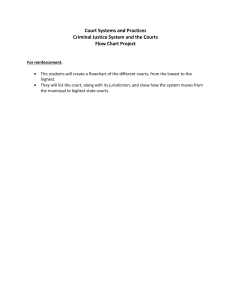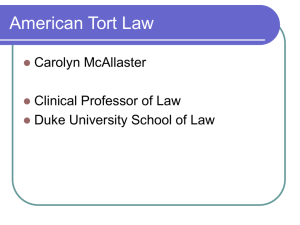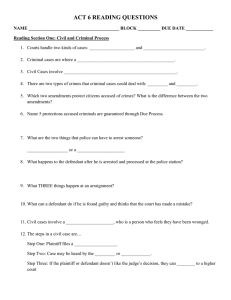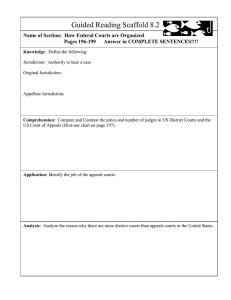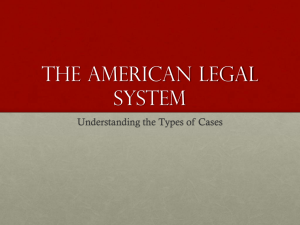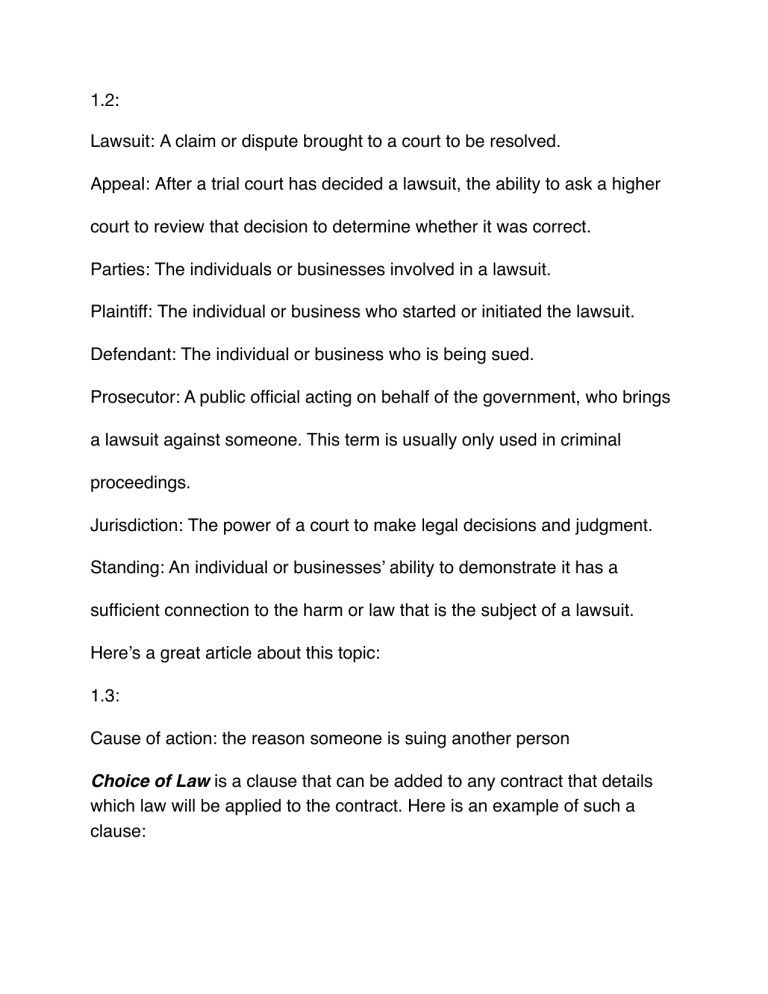
1.2: Lawsuit: A claim or dispute brought to a court to be resolved. Appeal: After a trial court has decided a lawsuit, the ability to ask a higher court to review that decision to determine whether it was correct. Parties: The individuals or businesses involved in a lawsuit. Plaintiff: The individual or business who started or initiated the lawsuit. Defendant: The individual or business who is being sued. Prosecutor: A public of cial acting on behalf of the government, who brings a lawsuit against someone. This term is usually only used in criminal proceedings. Jurisdiction: The power of a court to make legal decisions and judgment. Standing: An individual or businesses’ ability to demonstrate it has a suf cient connection to the harm or law that is the subject of a lawsuit. Here’s a great article about this topic: 1.3: Cause of action: the reason someone is suing another person fi fi Choice of Law is a clause that can be added to any contract that details which law will be applied to the contract. Here is an example of such a clause: Forum Selection clause is a little different, in that now the parties in a contract agree to “where” the lawsuit shall be led. Check out this quick video (below) explaining it. 1.4: Class notes: - laws (rights from the constitution): amendments - What is a statue? - (federal) Laws passed by congress - (Local) laws passed in California - Ex: weed federally illegal but legal in CA, feds could bust dispensaries if they wanted in CA but decide not to - Ex: CA law says you can’t false advertise and can face 250k ne or 6mo jail time - ex: business located outside of CA must pay taxes in CA if they are doing business within the state - What is administrative law: - Law that regulates the operation and procedures of government agencies, how they enforce law given to them by the legislature - ex: cdc introduced to help with public health based on law that was fi fi passed - Stare Decisis: to stand by things decided, the rule of precedent - A doctrine that is referred to when dealing with similar issues - Precedent: past ruling created by a court ^ - Federal precedent has jurisdiction over all states - Precedents set by states only need to be followed by the states Civil Law vs. Criminal Law: - Civil: - Pay in damages (money) - Judge cannot send defendant to jail - Can call defendant as witness - Preponderance of the evidence, prove more than the other side, burden rests with the plainti - Plainti is the person suing someone - Defendant is defending themselves - Punitive damages are meant to punish, beyond compensating, can be hundreds of millions - Only have two years for verbal contract, 4 years for written contract - Criminal: ff fi ff - Pay in freedom (jail time), nes, or educational classes - Cannot call defendant as witness (plead the 5th) - Prove beyond a reasonable doubt, burden rests with the government - Prosecutor and defendant - Can be found not guilty in criminal court but found guilty in civil court - ex: OJ found not guilty in criminal but found guilty in civil court for wrongful death, forced to pay millions - Business have right to: - Commercial speech: must concern lawful activity and not be misleading - Our legal system is common law (aka case law): voted people make laws that are interpreted in court, we then follow what judges say - Judges and lawyers in a civil system are more investigators - Three levels in Californias court system: - County court: where criminal and civil trials take place - Court of appeals: review cases appealed if one party protests decision - Supreme Court: 7 judges, nal decisions on verdicts for CA - Federal court system: - US DISTRICT COURTS - US COURT OF APPEALS - US SUPREME COURT - Jurisdiction: - Limitation on the types of cases a court can hear - 1. Subject of lawsuit - 2. Sum ($) in controversy - 3. Whether proceeding is trial or appeal Original and Appellate jurisdiction 1. Courts of original jurisdiction - where the case started (trial) 2. Courts of appellate jurisdiction have the power to hear an appeal fi for another court - State courts have almost unlimited subject matter jurisdiction (can hear any type of case) - Federal courts only have the power to decide certain types of cases - Limited subject matter jurisdiction: - Federal questions (laws that congress passed) - Diversity of Citizenship: - Diversity cases occur when: - 1. Parties not from same state and the amount of controversy is greater than 75,000 - Exclusive jurisdiction vs concurrent jurisdiction - concurrent: exists when two di erent courts have the power to hear a case - exclusive: ex: bankruptcy can only be heard in bankruptcy court International jurisdiction: - international courts seem to apply the “minimum contacts” requirements which the US courts apply - Therefore you need to be “doing business” within that jurisdiction ff - Put in your contract that cases will be heard in US court Can the US courts have jurisdiction over wang who lives in china? - Gucci case - using trademark and selling counterfeit Gucci goods within the US Process of ling lawsuit: 1. Complaint 2. Complaint served on defendants: email, mail, must prove 3. Response led 4. Research and strategy 5. Discovery: investigation, gathering documents and answers to questions 6. Depositions: interviewing people 7. Mediation 8. Trial prep 9. Trial 85%-90% of civil cases settled before trial review: preponderance of evidence: 51% chance they did it : beyond a reasonable doubt: 99% chance they did it fi fi Complaint and response
